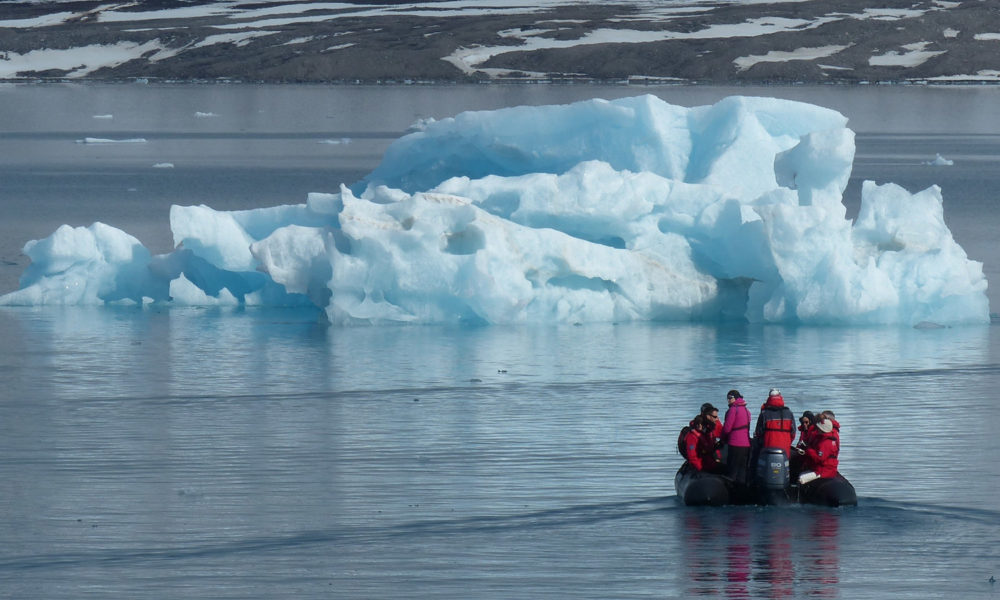If there is one part of the world where science must inform policy during rapid climate change, it is the Arctic region. Warming three times faster than the rest of the planet, the Arctic is transforming from a region of ice and snow into a greener, wetter, warmer environment that is testing the resilience of communities, ecosystems, and economies while impacting the rest of the world with sea level rise and atmospheric uncertainty.
The region’s vulnerability, however, did not stop the previous administration from purging Arctic experts, denying the climate crisis, and debasing the role of research in the region. The damage to Arctic research, resilience, and the American reputation as a regional leader was profound.
In recent weeks, however, the Biden administration has taken important steps to repair the damage, much to the relief of scientists, policymakers, businesses, and the Indigenous People of the north.
Undoing the damage
A quick recap of the Trump administration’s actions: In addition to marginalizing agency efforts to implement climate resilience actions in the Bering Strait region and purging experts like myself from Arctic policy efforts, the administration shelved the White House Arctic Executive Steering Committee and replaced many of the well-regarded scientists and experts on the Arctic Research Commission (ARC) with unqualified, low-level political associates with no Arctic experience.
For example, Alaska’s former Lt. Governor Fran Ulmer, the prior Chair of the Commission, is a highly regarded expert with a long history of engagement on Arctic issues. She was replaced by a low-level political operative with no Arctic experience whatsoever. The president even sent Secretary of State Mike Pompeo to a meeting of the Arctic Council, an intergovernmental body of diplomats representing the eight Arctic nations, to crow about the benefits of climate change rather than address the crisis.
These action badly damaged America’s reputation among the other Arctic states, hobbled efforts to address the climate crisis in the region, and effectively shut down research progress at the Arctic Research Commission.
Bringing back Arctic science and expertise
Not a moment too soon, the current administration has moved to repair the damage. First, they fired the unqualified Arctic Research Commissioners, sending the signal that the Arctic Research Commission was no longer a frat house to populate with allies who couldn’t find work elsewhere.
The list of new replacements, announced last week, reads like a who’s who of Arctic experts and influencers. New Chairman Michael Sfraga has been leading and convening Arctic problem-solvers for decades and currently leads the Polar Institute at the Wilson Center. Mark Myers has been active in Arctic research for decades and has worked for both Republican and Democratic administrations. David Kennedy is a holdover from the Trump years who’s known as an effective agency leader with 50 years of experience in Arctic issues. Elizabeth Cravalho is an Alaska Native and Vice President of a prominent Alaska Native Corporation. Jackie Richter-Menge is a decorated scientist and climate expert in the region. Deborah Vo, born and raised on the lower Yukon and now working with the Rasmuson Foundation, has worked closely with Senator Murkowski and others to advance Arctic policy solutions for many years.
One-third of the appointed commissioners are Indigenous, half are women, and two-thirds are residents of Alaska, mirroring the requirements for the Commission that the Trump administration had jettisoned.
The ARC is back in business, and not a moment too soon, as extreme conditions, ice loss, and ecosystem disruptions accelerate and a socially-crippling pandemic threatens community resilience.
But the work didn’t stop there. The Biden administration also announced the reactivation of the Arctic Executive Steering Committee at the White House and appointed Dave Balton, one of America’s top Arctic diplomats for decades, as its executive director. Not only does his appointment signal a reinvigoration of Arctic policy interest at the White House, installing a highly-regarded diplomat in the position also sends a message to America’s Arctic partners that the self-serving posturing of the previous administration is a thing of the past and partnership and collaboration are back on the table.
Appointed as Balton’s Deputy Director, Raychelle Aluaq Daniel is a highly qualified Yup’ik and Arctic expert born and raised in Alaska. I’m proud to say that Raychelle was one of my hires at the Interior Department years ago, and her understanding of Arctic science and policy issues was extraordinary even then. I’ve worked closely with both of these new leaders and am excited to see what they will create in the White House as they work to deliver a coordinated US answer to the many challenges in the region.
For those of us who understand the dire implications of a transforming Arctic, these actions signal that the administration is listening and is eager to bring the best and the brightest to Arctic issues and quickly put the neglect of the previous administration behind us. On the international front, exhausted from years of childish antics, colleagues around the global Arctic are optimistic once again about partnering with America on solutions to regional crises.

